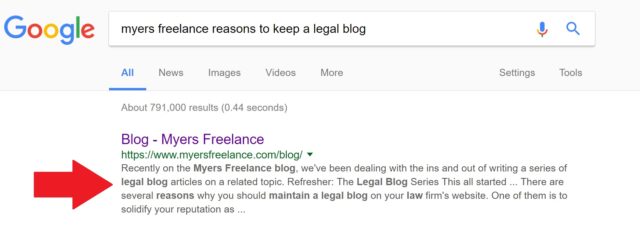Last December, we covered a big development in the world of search engine marketing (SEM): Google had increased the length of the meta descriptions they were showing in the search engine results page (SERP). Now, though, Google has walked back this expansion and returned to nearly where we were, before.
Let’s unpack that and see what it means.
Refresher: Meta Descriptions
The meta description is the synopsis of a webpage that the page’s author gets to have prominently displayed, right in the SERP:

While these meta descriptions do not impact the page’s search engine optimization (SEO), they are a helpful way to appeal directly to potentially interested readers and get them to click through to you page. In that sense, meta descriptions are like the inside flap of a book: They are a very useful way to reach out to the reader and convince them that the rest is worth a read.
The Old News: Google Expanded Meta Descriptions
Originally, these meta descriptions could only support around 160 characters—very little space to effectively summarize a page of content from your legal blog or landing page.
Last December, though, Google radically expanded this character count, allowing meta descriptions to go as high as 300 characters. While this gave law firms an excellent avenue to put important information directly into the SERP, it also formed a double-edged sword: The new length made it more likely that there was a passage from the article that was more pertinent for the search query. In these cases, Google would show that passage in the SERP, rather than the meta description that had been provided for the article. While there were benefits to this method—odds were higher that there would be crucial keywords in the passage than in the meta description provided—it also deprived sites of the ability to control what potential viewers saw, first.
The New Development: Google Walks Back Expansion
Now, Google has walked back the earlier expansion. In fact, the retraction has brought us back to nearly where we were, before, with meta descriptions sitting around 160 characters for Google searches done on desktop, and 130 for the 58% of the searches done on mobile devices.
According to Google, though, “there is no fixed length for [meta descriptions]. Length varies based on what our systems deem to be most useful.”
Our search snippets are now shorter on average than in recent weeks, though slightly longer than before a change we made last December. There is no fixed length for snippets. Length varies based on what our systems deem to be most useful.
— Danny Sullivan (@dannysullivan) May 14, 2018
A quick study done by Yoast found that this has often meant disregarding the provided meta description, entirely, and displaying a passage from the article in the SERP, instead.
What this Means for Legal Blogging

It means a lot of things. Some of them, we already knew and covered in our blog, before, but which bear repeating because of their renewed importance.
Don’t Sweat the Meta Descriptions… As Much
Yoast’s finding that Google tends to pull passages from a webpage rather than display the provided meta description, if true, says that agonizing over the meta description is a poor use of time. Focus your attention on the content of the article, instead.
Keep Blogs and Pages Cohesive
Again assuming that Yoast is correct and that most meta descriptions are going to be pulled from the body of a webpage, it becomes increasingly crucial to keep the topic of a post or page cohesive. If your topic varies, the meta description Google pulls from the article might be only tangential to what the potentially interested reader is looking for and making them go elsewhere.
Create Sound Bites by Embedding Meta Descriptions in Your Blog
If Google is going to ignore the meta description you provide and use passages from your webpage more often, then work your meta description into your legal blog or landing page. A good meta description is just a very succinct and catchy synopsis of what the page is about. It’s the “hook” that piques the reader, tells them what the piece is about, and persuades them into reading more.
It’s a sound bite, and there’s no reason why you can’t integrate that into the body of your piece.
Search Engine Marketing Evolves, Quickly
One of the very first articles we wrote on our online legal marketing blog was that search engines are complex creatures, prone to changing without a moment’s notice and leaving marketers and law firms scrambling to keep up. This is just another example of that evolution, and highlights the need for hiring the professional legal bloggers at Myers Freelance.